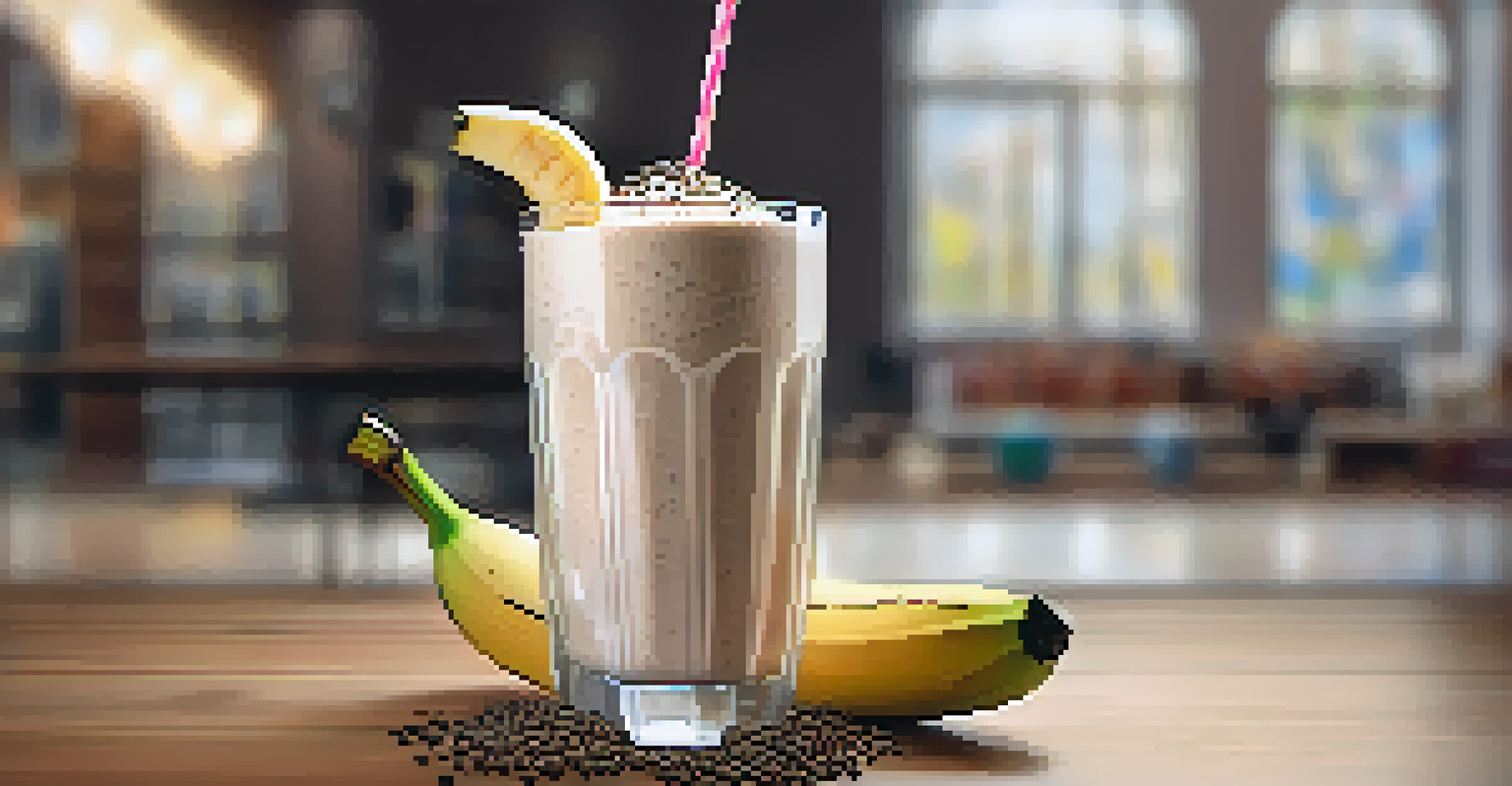The Importance of Meal Timing in Bodybuilding Nutrition

Why Meal Timing Matters in Bodybuilding
Meal timing plays a crucial role in bodybuilding, as it directly affects your energy levels, recovery, and muscle growth. Eating the right foods at the appropriate times can optimize your performance, helping you make the most out of your workouts. Essentially, it's not just what you eat, but when you eat that determines your success in the gym.
You are what you eat, but more importantly, you are when you eat.
For bodybuilders, timing meals around workouts can enhance recovery by ensuring that muscles receive the necessary nutrients right when they need them. Think of it like watering a plant: doing so at the right time encourages growth, just as proper nutrition at specific intervals fosters muscle repair and growth.
Furthermore, strategic meal timing can help regulate your metabolism. By eating at regular intervals, you can keep your body in an anabolic state, which is favorable for muscle gain. This means that understanding your body's needs and responding accordingly is key to achieving bodybuilding goals.
The Anabolic Window: What You Need to Know
The anabolic window refers to the post-workout period when your muscles are especially receptive to nutrients. This timeframe, often cited as 30 minutes to two hours after exercise, is critical for maximizing muscle recovery and growth. Consuming protein and carbohydrates during this window can significantly enhance your results.

To illustrate, consider your muscles like sponges after a workout; they're primed to soak up nutrients. If you provide them with a mix of protein and carbs during this period, you're essentially fueling the recovery process and setting the stage for muscle growth. It’s an opportunity you don’t want to miss!
Optimize Meal Timing for Gains
Strategically timing your meals around workouts enhances recovery and optimizes muscle growth.
However, the concept of the anabolic window is often misunderstood. While it is beneficial to eat soon after working out, the overall quality and consistency of your diet play a more significant role in your bodybuilding success. So, while timing is important, don’t neglect the bigger picture of your nutrition plan.
Pre-Workout Nutrition: Fueling for Success
What you eat before hitting the gym can significantly impact your performance. Consuming a balanced meal or snack about 1-2 hours before your workout provides your body with the necessary fuel to power through those tough lifting sessions. This meal should ideally be rich in carbohydrates and moderate in protein.
Good nutrition creates health in all areas of our existence. All parts are interconnected.
Imagine you’re preparing for a long road trip; you wouldn’t start driving on an empty tank! Similarly, a well-fueled body helps ensure that you have the energy to lift heavy and train hard. A good pre-workout option could be a banana with peanut butter or a protein smoothie.
Additionally, hydration plays a vital role in your pre-workout nutrition. Staying hydrated ensures that your muscles are functioning optimally during your workout. Don’t forget to drink water leading up to your session; it’s just as crucial as your food intake.
Post-Workout Nutrition: Recovery Essentials
Post-workout nutrition is about replenishing your body and kick-starting recovery. After an intense workout, your muscles are depleted of glycogen and need nutrients to rebuild. A meal rich in protein and carbohydrates within an hour post-exercise can help accelerate this recovery process.
Think of your body as a construction site after a workout; it needs the right materials to repair and build stronger muscles. A protein shake with a piece of fruit or a chicken and rice meal can be perfect options to refuel and repair. The key is to ensure that you're providing your body with what it needs to recover effectively.
Prioritize Post-Workout Nutrition
Consuming protein and carbohydrates soon after exercise is crucial for muscle recovery and growth.
Moreover, incorporating healthy fats can also support recovery, but they should be consumed in moderation immediately post-workout. Fats slow digestion, so it's wise to focus on quicker-digesting proteins and carbs right after exercising, and save the fats for later meals.
Meal Frequency: How Often Should You Eat?
The frequency of your meals can influence your muscle-building efforts. Many bodybuilders subscribe to the idea of eating smaller, more frequent meals throughout the day to maintain energy levels and support metabolism. This approach can help prevent hunger and keep your body in an anabolic state.
However, meal frequency is not a one-size-fits-all solution. Some people thrive on three larger meals a day, while others prefer the smaller meal approach. It’s important to listen to your body and find a routine that works for you and fits your lifestyle.
Ultimately, the quality of your meals is more important than how often you eat. Focus on incorporating nutrient-dense foods into your diet, and ensure you’re meeting your macronutrient needs—protein, carbohydrates, and fats—regardless of meal frequency.
The Role of Sleep in Meal Timing and Nutrition
While meal timing is essential, the role of sleep should not be overlooked. Sleep is a critical component of recovery, and it can affect your hunger hormones and appetite regulation. Getting adequate rest allows your body to repair itself and utilize the nutrients you consume more effectively.
Imagine trying to build a house during a storm; without a solid foundation, it won’t stand. Sleep acts as that foundation for muscle recovery and growth. Prioritizing a consistent sleep schedule can enhance your overall performance in the gym and improve your nutrition strategy.
Customize Your Nutrition Approach
Listening to your body's unique responses to food helps personalize meal timing and improve performance.
Additionally, poor sleep can lead to cravings and poor food choices, making it harder to stick to your meal plan. Ensuring that you get quality sleep can help you make better decisions regarding your meals and timing, ultimately supporting your bodybuilding goals.
Listening to Your Body: Personalizing Your Nutrition
Every body is unique, which is why a personalized approach to meal timing and nutrition is essential. Factors such as age, metabolism, activity level, and individual goals all play a role in how your body responds to food intake. Therefore, it’s important to pay attention to how you feel and adjust accordingly.
For instance, some individuals may find they perform better with a light snack before workouts, while others may prefer to train on an empty stomach. Keeping a food journal can help you track what works for you, allowing you to refine your meal timing strategy over time.

Ultimately, the key is flexibility. As you progress in your bodybuilding journey, your needs may change. Stay open to experimenting with different meal timings and compositions to discover what truly aids your performance and recovery.